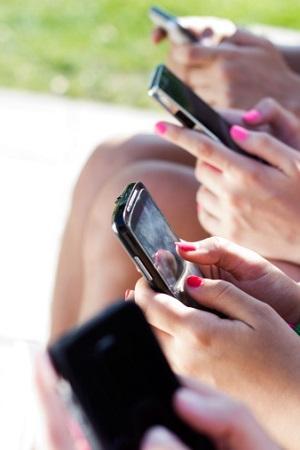
I love my iPhone and my iPad. I use them to listen to music, play games, text with my friends and family – in fact, I can freely admit that I will choose to text someone rather than make a phone call. It's quick, it’s easy, and it doesn't distract me from something else. Recently, I realized that I checked my phone before I walked out to go down to my car and once I got into the drivers' seat, I checked it again.
Why? Did I really think I was going to miss something that was that important in a time span of three minutes? No, I didn't, but I’m addicted to checking my phone.
Recent studies suggest that the average smartphone user checks their phone 150 times a day.
We use these kinds of devices for everything. We keep our lives organized in the calendar applications, read all of our books on screens, and we share messages and videos with friends and family right from the palms of our hands. It's great to live in an age where being able to talk to my brother while he was deployed was as simple as an internet connection, but our reliance on technology is not all fun and games.
Smartphones have recently been proven to cause insomnia. Harvard researchers published results on how our dependency on technology has crept to the bedroom and is now throwing off our body's "light-dark cycle", which is spurning an increase in insomnia. Head researcher, Charles A. Czeisler, reports that as we expose ourselves to more artificial lights we "dramatically changed the timing of our endogenous circadian rhythms."
Overexposure to devices that think for us have caused an interesting phenomenon dubbed by Psychology Today as "The Google Effect". Research from a 2011 study found that people are encouraged to think less as we have more access to search engines right in our hands. Have you ever watched a movie and thought "hey I know that guy" and then turned to Google to type in a long and vague question to see what pops up, rather than trying to recall his face in your memory bank? That is the Google Effect.
Your brain at rest can actually be one of your most creative and productive times. Research in the early 1990s showed that your brain never really stops, even when your body is at rest. A resting state allows your brain to entertain ideas that seem random in nature. In contrast, when you are focused on a detailed activity, your brain devotes most of its energy to the task at hand. I think that being constantly tired to a device limits the ability of our brains (at least my brain) to allow those random thoughts and ideas to flow.
It’s not just your brain and creativity that can suffer from overuse of your smartphone. An Auckland chiropractor reports a rise in cases of cervical kyphosis. The curvature of your spine at the neck is developed as baby during "tummy time" when you practice holding your head up. Cervical kyphosis is the straitening of the vertebrae at the base of your neck, and many medical professionals are cautioning cell phone users to the dangers of looking down all of the time.
That's not to say that smartphones don't do a lot of good for us and social networks. Studies have been conducted after disasters (like tornadoes) that give credit to social networks and text messages for helping to get messages to those in the paths of dangerous weather to seek shelter.
The development of applications for your phone range from games to technology that allows you to save money – like with the Nest learning thermostat or can even keep your medical information on hand in the event of something happening to you. Applications allow you to store your current medications, dosages, and even if you have an allergies. In the event of an emergency, EMTs or doctors can have quick access to your medical history so that they can best attend to you when you arrive at the emergency room.
Smartphones can enrich our lives but I think it's always important to remember that too much of a "good" thing can be bad. Change your habits by putting away your phone for thirty minutes to an hour when you get home and letting your brain "idle" or delete applications that you’re constantly checking.
Are you up to the challenge? (I don’t know if I am but I'm going to try.)

